SILS Assistant Professor Francesca Tripodi Publishes New Research on the Role of Search Engines in Propaganda
The University School of North Carolina at Chapel Hill School of Information and Library Science (SILS) Assistant Professor Francesca Tripodi published her new book The Propagandists’ Playbook on Aug. 16.
 Through the mechanics of information literacy, networked media, search-engine optimization, curated keywords, and strategic signaling, the book is an examination of what algorithmic polarization means for society. Drawing on original research, Tripodi explains how conservative elites use media literacy tactics and search engine optimization to spread ideas that threaten the democratic process.
Through the mechanics of information literacy, networked media, search-engine optimization, curated keywords, and strategic signaling, the book is an examination of what algorithmic polarization means for society. Drawing on original research, Tripodi explains how conservative elites use media literacy tactics and search engine optimization to spread ideas that threaten the democratic process.
The book is a product of research Tripodi conducted over the course of the past four years. To collect data, Tripodi conducted interviews and ethnographic observations of two Republican groups over the course of the 2017 Virginia gubernatorial race – including Tripodi’s firsthand experience of the 2017 Unite the Right rally – with content analysis, media immersion, and web-scraped metadata.
Tripodi was inspired to use the findings of her research to publish The Propagandists’ Playbook to better inform people on how their world views or biases affect the way they search and influence the kind of information that is returned to searchers.
“Many of us go to the internet with lots of great intentions, and we try to get really good information with the goal of furthering what we think we know,” Tripodi said. “Most of us don’t recognize that, through that process, we can end up in extremely problematic rabbit holes of information, and that this desire to search for information has been weaponized by people who know exactly what they’re doing.”
Tripodi says the findings of the research presented within the book can be used in a multitude of ways. First, in the classroom, to study how search engine optimization is more complex than we know through the fields of information science, sociology and communications studies. For the general public, the research findings present an opportunity to identify the way in which personal biases can affect the way we find information and the information that is presented to us.
But for all audiences, Tripodi has one main goal.
“The one thing I hope people can get from my book is how our queries – our starting points – and how our keywords really drive the returns that we receive,” Tripodi said.
